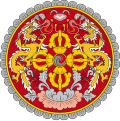Talk:Ethnic cleansing in Bhutan
| This article is rated Start-class on Wikipedia's content assessment scale. It is of interest to the following WikiProjects: | |||||||||||||||||||||
| |||||||||||||||||||||
==Wiki Education assignment: Ethnic Politics==![]() This article was the subject of a Wiki Education Foundation-supported course assignment, between 17 January 2022 and 16 May 2022. Further details are available on the course page. Student editor(s): JulianB2024 (article contribs). Peer reviewers: Eks 295.
This article was the subject of a Wiki Education Foundation-supported course assignment, between 17 January 2022 and 16 May 2022. Further details are available on the course page. Student editor(s): JulianB2024 (article contribs). Peer reviewers: Eks 295.
Title change?
[edit]I suggest a title change. This article is exclusively about the Lhotshampa people, shouldn't the title be changed to reflect that it is about one topic, not multiple? I suggest the "Bhutanese Refugee Crisis".
What about "Ethnic cleansing of the Lhotshampa people in Bhutan"? --ISometimesEatBananas (talk) 18:21, 26 October 2024 (UTC)
Concerns About Bias and One-Sided Representation in This Article.
[edit]Dear Wikipedia editors,
I would like to raise concerns about the neutrality and accuracy of this article. Currently, the article presents the Lhotshampa migration issue from a highly one-sided perspective, largely based on sources that may not fully represent Bhutan’s official stance and historical realities.
Concerns:
The article seems to focus excessively on negative portrayals of Bhutan, often citing biased sources that have historically sought international sympathy.
It uses highly disputed figures (such as the claim of "100,000 refugees") without mentioning alternative estimates from Bhutanese or neutral sources.
The term "ethnic cleansing" is politically charged and not universally accepted—it should be replaced with more neutral language or at least balanced with alternative perspectives.
There is a clear lack of Bhutan’s own perspective, including official government statements, cultural context, and national security concerns at the time.
Certain contributors appear to be pushing a particular narrative, using multiple platforms to portray Bhutan as a repressive country, when in reality, Bhutan remains one of the most peaceful nations in the world today.
Suggested Improvements:
✅ Adding alternative population estimates from different academic and government sources.
✅ Including Bhutan’s policies on citizenship and cultural preservation that explain why certain actions were taken.
✅ Balancing the language—removing exaggerated terms unless fully supported by multiple academic sources.
✅ Highlighting that many Lhotshampa people still live in Bhutan today, some even serving as ministers and officials, proving that Bhutan did not indiscriminately expel an entire ethnic group.
✅ Fact-checking sources—removing or challenging sources that lack credibility or appear to be politically motivated.
I am happy to provide sources to support these points and welcome feedback from neutral editors. Or else this topic should be putdown if it is not improved for that fact that the article is mostly based on weak or biased sources.
Best regards,
Druk & Drukpa Druk&drukpa (talk) 10:52, 7 February 2025 (UTC)
- You are just pasting chatgpt response, without clearly pointing what to change and with what. Like what do you mean by "Adding alternative population estimates from different academic and government sources.", clearly it is a chatgpt response. It is so vague, which citation are you talking? What would be the good source (link to that source)? If you think something can be replaced don't say it because you feel like it, say it with proof and say like "hey, i think this source you cited is wrong and this information is misleading. Instead I purpose you to look into this source which is more credible."
- All your suggested Improvements are ChatGPT generic response and so much vague. Please be clear. 2603:6011:C8F0:79B0:B85C:31EC:8AB8:30A8 (talk) 02:09, 1 June 2025 (UTC)



